Morocco Motorcycle Trip Report - Day 3
Monday, 29 September 2014
The breakfast wasn't anything as good as the dinner we had the previous night, but I wouldn't be complaining if I knew how boring breakfast in Morocco would be. After all, you can't really moan much about croissants with butter and jam, but I think the experience of sitting at a stainless steel bar counter to eat it felt odd. The coffee was great though, even so I refrained from having a 2nd cup as I didn't fancy needing to stop for a leak all too often.
We got geared up, unlocked the bikes and I checked oil. Before the trip I was only really doing short distances, bar the trip to the August bank holiday meet. I'd noticed the Strom was using a bit more oil than before the restoration. I packed a litre of engine oil for this reason and ended up using all of it, the half litre Locky was carrying and almost another half litre I had to buy. I guess I should've replaced those valve stem seals when I noticed they were weeping a bit while replacing the headers during the reassembly for the restoration. On the subject of unlocking the bikes, Locky had bought a 2m Kryptonite cable and taken a shackle disc lock along. We used this to lock the bikes together each night except for the nights where the bikes were being guarded by guards working for some of the hotels we slept at. You can see the cable lock tied around the back of his bike in the picture below. I'm not sure this kind of security was really needed, but it did give a nice sense of security. It wouldn't be easy to steal two heavy Stroms locked together with the lock not being able to reach the ground. Any attempt at getting past our security measure would surely make noise and attract attention. I doubt there's much market for big bikes like ours or for their parts, most bikes in Morocco are scooters and step through low capacity bikes, we hardly saw any locals on large capacity bikes.
At Santa Cruz motel we could park our bikes around the back under a car port so that they aren't visible from the road:
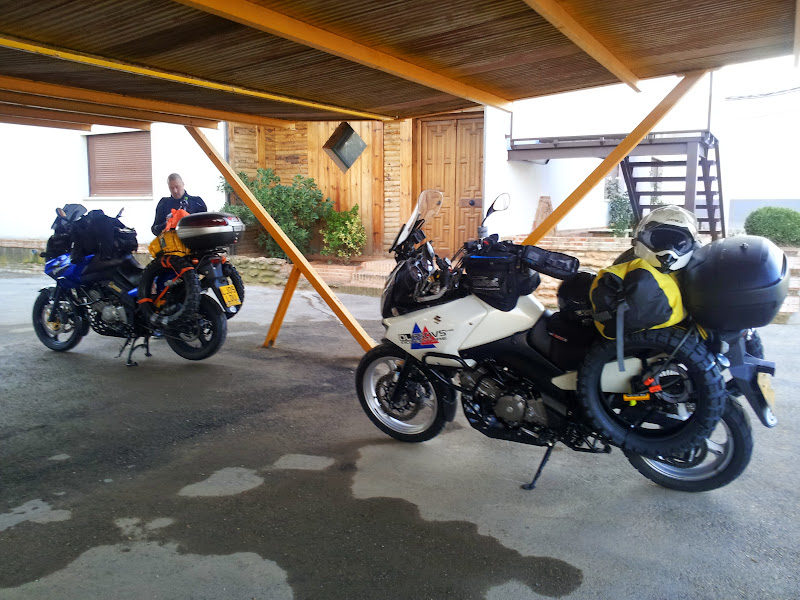
Our next stop was the ferry port in Algeciras, Spain. We'd heard that we can buy tickets at the port and I figured this was the best way to go as you'd have much less chance of being scammed than buying from touts. I expected a lot of touts, but really there were only a few people around, quite obviously touts, trying to stop people and ask where they are going and if they needed tickets. We stopped when the first of such people waved us down, I meant to ask directions to the ticket office, but realised they'd waste our time more trying to flog us tickets than if we just went ahead and figured out where the ticket offices were ourselves. They tried to talk to us in Spanish, French and English, but I pretended that I didn't understand any of it so we could get out of there quickly. We followed some signs, ignored a "no motorcycles" sign like someone else seemed to be doing and ended up parked right across from a lot of ticket offices.
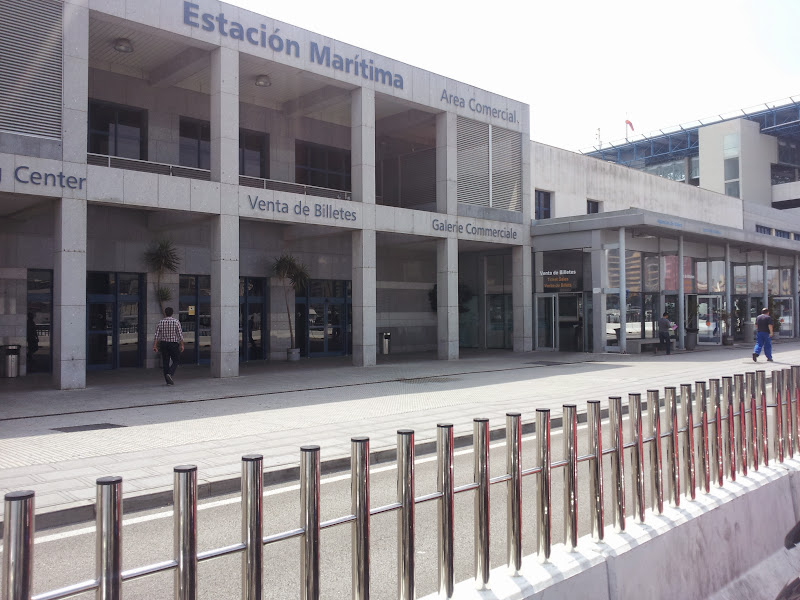
Locky guarded the bikes and I took our passports in to try get the next ferry out. At the 3rd window I got to a bloke who told me the ferry is leaving at 14:30. This was great as it would be in the next 20 minutes, but the fekker was lying, we only left at 15:30. Still, this wasn't too bad for us and there was nothing we could do about it anyway. For reference, we paid €54 each for a ticket to cross with a ferry company called Acciona. We thought it a good price and on the ferry someone who regularly travels over told us that the best place to buy tickets was the ferry port offices. I could pay with my credit card and, even though I didn't understand much of what the bloke at the ticket booth said, we got by with writing times and money amounts on paper and hand signing while trying to talk in whichever language we could find a word that the other seemed to understand. He also gave us some customs forms that need completing on the boat. I asked the ticket salesman which signs to follow and got the wrong directions. Luckily we found security guard who could speak enough English to direct us in the right direction. We queued, had our passports and tickets looked over and then skipped the queue for the ferry to near the front. Here we parked up and had part of our tickets torn off by someone who was walking around making sure everyone had a ticket to board the ferry.
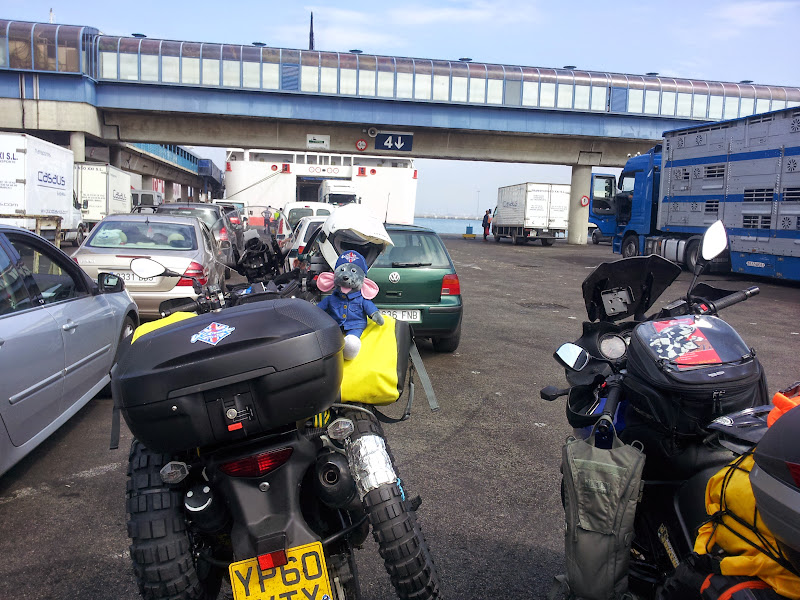
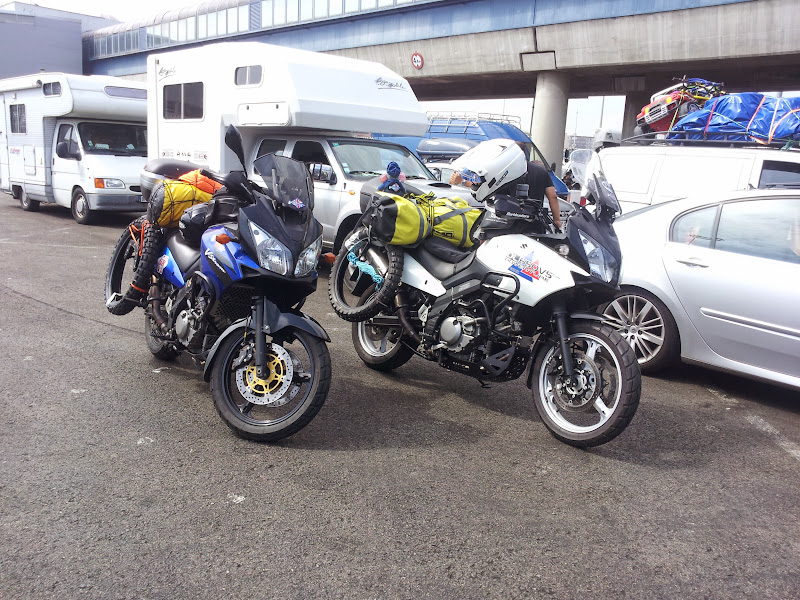
It was quite obvious that Africa's influence was this side of the water already. There were a lot of old cars, overloaded and badly maintained. People would try to jump the queue to get on the ferry only to be reprimanded by others leaning on their horns. Ferry workers also got the horn treatment if someone was thinking they let someone board that should've waited or if they seemed to be too slow at what they were doing. We figured they could let us go in first, we are small vehicles and we're cooking in the sun, so we moved forward a bit. This wasn't the way they thought about it, all the articulated lorries were reversed in first, then large lorries reversed in and so it carried on coming down in size until we eventually were allowed to board last. The next unconventional bit was that the way the bikes were tied down, not the usual strap over the seat. They were stood up next to a wall with cushions in between the bike and the wall and then strapped to some railings or whatever there was available so that they would stay like that. The one idiot wanted to put a rusty metal hook around my nicely powder coated front fork tube and I stopped him and tried to explain that it will scratch. He seemed to understand and left it and went off, presumably to fetch something else or something to protect the fork tube with. The bike was strapped down enough anyway and we got ushered out the parking area. Being last ones in and having to wait to get strapped down we were last ones up stairs. Here we found out we needed to join a long queue where our passport would now be checked and the customs form we need to fill out would be presented. We filled in our customs forms, it's only a few easy questions, and joined the queue. With only a single official checking everyone's passport it took about 45 minutes before we got to the front. The official looked tired and grumpy, but a few jokes and he was smiling while helping us. He stamped a police number in our passports, this number is only stamped if it's your first visit to Morocco (after that you use the same number for other visits.) After this we went and sat outside to get some of the cooler fresh air.
The ferry took about an hour and a half to cross to Morocco. When we got to the parking area I noticed the fekking bloke who tied my bike down had returned only to put the rusty hook around my fork tube anyway. Being on last at least meant that we got to leave the ferry first. We rode off and was stopped by an official looking bloke who checked that our passports had the police stamp and sent us on our way. We followed the road out and got to customs. We'd filled in and printed temporary vehicle import forms online before we left the UK and we now took these out, along with our passports, in the hope that officials would see we came prepared and help us sooner. Whether this was the thing that got us helped or whether they just liked to do bikes first we don't know, but we were soon called forward. Here the official, who couldn't speak any English, enquired if it's our first time in Morocco and we understood enough to tell him that this was the case. He called over another official who could speak a little bit of English, we were directed to go back to some booths that we passed on the way in, apparently our police number needs to be checked. Why they couldn't have stopped us at the booths when we passed them to start with is beyond me. We walked over there and some person, obviously not a policeman, checked our passports. He could speak some English so we struck up a friendly conversation while he went about doing the checking. When this was done we went back up to where our bikes were, but the official was nowhere to be found and wasn't coming our way. Knowing a bit about how things in Africa work I left Locky at the bikes and went off with our passports to find him. I found him near an office where there were some computers, it was obviously the base of operations. Smiling and being very friendly I got his attention and showing him the passports with the stamp that they've been checked. He gave our passports, along with the temporary vehicle import forms to some computer jockey and told me to wait. I could see him telling the computer jockey to do ours first. Not long after, maybe 5 minutes, he came out with our passports and the two parts of the temporary vehicle import forms that we have to keep. He managed to explain it was all done and we could go and I thanked him (by now my supply of "friendly" was running out, luckily there was plenty of sun to recharge it a bit.)
A quick note on the temporary vehicle import forms: you're allowed to import your vehicle for up to 6 months of a year. It's best if the vehicle is in your own name. If not you need a letter from the owner stating you are allowed to use it and possibly other stuff too. You need to take your V5C, but I used a colour copy and left the real one in my tank bag, I don't think they know the difference. You can fill in the triplicate temporary vehicle import form at customs if you want to, they will give them to you, or you can do what we did, complete them online. I recommend completing them online before you leave the UK. You can take your time and make sure it's right, this will save you time at customs. The online form prints out in three parts, you have to sign at the bottom of each. Once you get your police number put in your passport on your first entry to Morocco you can write it in on the printed form. If it's not your first time you can put your existing number in when you complete the form online. When you get into Morocco, at customs, they take one part of the three and give you the other two back. When you leave Morocco they take another part and then give the last part back. That last part is your proof that you exported the vehicle again. It's a lot less complicated than it sounds, the worst bit is figuring out how to fill the form in online, it's not that obvious how to get to it or what to put in the boxes. I used Google translate to get by on the website.
With the temporary vehicle imports done, we were ready to leave port, we rode 50m only to be stopped again, this time they were checking that we've done the temporary vehicle import. We showed the two stamped forms we had just receive back and was waved through. Not far up the road we came to a parking area. This was where people parked to go to the ticket offices for crossing back to Spain. There were some banking kiosks, some ATMs and a vehicle insurance kiosk. We parked up, Locky changed all his Euros for Dirhams (he got 11 dh for each euro) and we bought bike insurance for 10 days (620 dh each.) I wanted to get some dirhams, but was told they only change cash and that they can't take my cards. Figuring that it might be different at a proper bank rather than a little kiosk I decided not to use the ATM to get money now. Turns out it's no different at a "real" bank and I had to get money out the ATMs for the rest of the trip. I could get a max of 2000dh per day out of an ATM, much more than you'd need. Very surprisingly, there were no touts anywhere at the port, I don't think they are allowed inside. There were some behind a very high fence, that would be almost impossible to climb, trying to get the attention of people, but they were mostly ignored, including by us.
Now we finally left port, the sun was still out, but it was going to get dark soon. We'd decided that our first night would be spent at a hotel called Dar Enchaouen in Chefchaouen. We got this hotel "recommendation" when we watched a DVD that the owner of AdventureSpec made on a trip to Morocco. The roads started off looking good, wide two lane dual carriage ways with palm trees on the side of the road and good tarmac. This only lasted a few miles around the port before we got onto "normal" Moroccan roads. We found ourselves going through a mountainous region on a road that just had a crazy amount of twists and turns. This combined with going up and down hills constant made for really good riding. Moroccan traffic isn't very heavy, but the way they drive is shocking. Cars are coming at you with two wheels over the line in your lane around every blind bend and faster than they should. These same cars are almost always old bangers that pollute the air so badly sometimes that you can feel it in your lungs when you breathe if you couldn't already see it. Overtakes are dodgy at best and vehicle maintenance seem to be something they only ever see on television, those that have a television. There's definitely no form of MOT around here and I'm sure I wasn't the only one that was thinking "welcome to Africa" as we were riding. Road works seemed to pop up without any real notice and the diversions around where they were working were usually dangerous. Health and safety isn't something that's a concept around these parts, at least not in any recognisable form. After a while I stopped to check that Locky was doing OK with the traffic shock and to tell him to watch out for the old Mercedes taxi drivers, they were the worst. We continued riding to Chefchaouen and ended up riding in the dark on these crazy twisty roads where there wasn't even safety barriers on each turn. In a weird way this was fun, a real feeling that we're in adventure territory now. We arrived safely in Chefchaouen, but it took us a while and some asking around to find the hotel.
At the hotel the first people we encountered were the two 'security guards'. They were the ones watching customer vehicles 24h a day. They opened an iron gate for us and we parked the bikes behind a wall under a big beach sun umbrella. We asked how much it costs for them to watch the bikes and was told 50dh per bike. I wasn't paying or agreeing to that without getting a second opinion. With Locky waiting at the bikes I went to the hotel reception and was pleasantly surprised that they spoke good English, it seems most of their customers are foreign. The bloke at the desk was very helpful, told us the bikes are parked in a safe spot and that the guards are already being paid by the hotel, but that tips are in order. Turns out a 20dh tip each was more in the right region. We booked into the hotel and had dinner, I had goat tagine with prunes and Locky had some kofta kebabs.
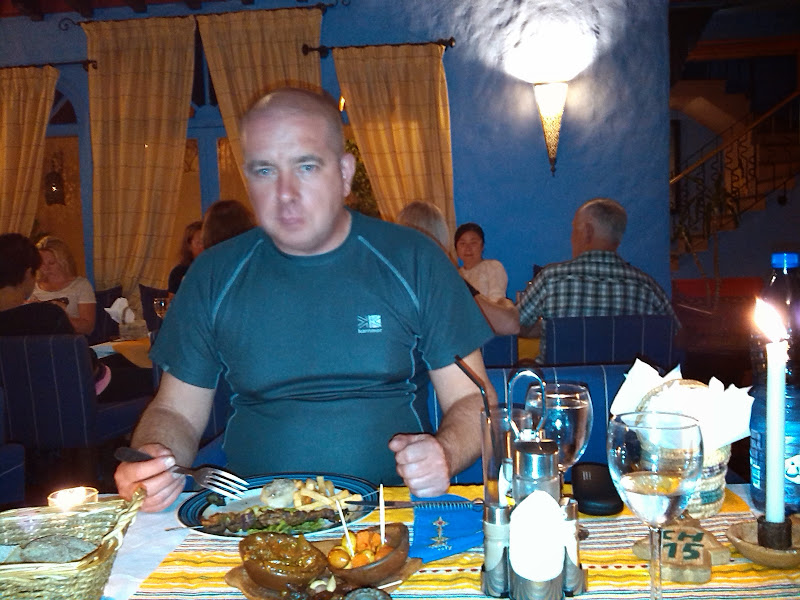
The goat tagine was very tasty and I figured that Morocco would be good if all the food was this good. I gathered Locky also enjoyed his food a lot. They brought us mint tea after dinner, Locky likes it, but I think it's a bit disgusting, I'm not a big mint lover though. They didn't sell any beer or wine, but we knew that some places might not.
The hotel was quite nice inside and, as is the case with many buildings in Chefchaouen, many of the walls were painted blue. Our room was quite nice, the taps were copper plated and the basin was made out of a piece of shaped copper. Beds were nice and solid and everything was nice and clean. Overall this was one of the nicer hotels where we stayed at and the prices weren't bad either, I would definitely stay there again.
Another of my all too often shaky pictures of the restaurant area:
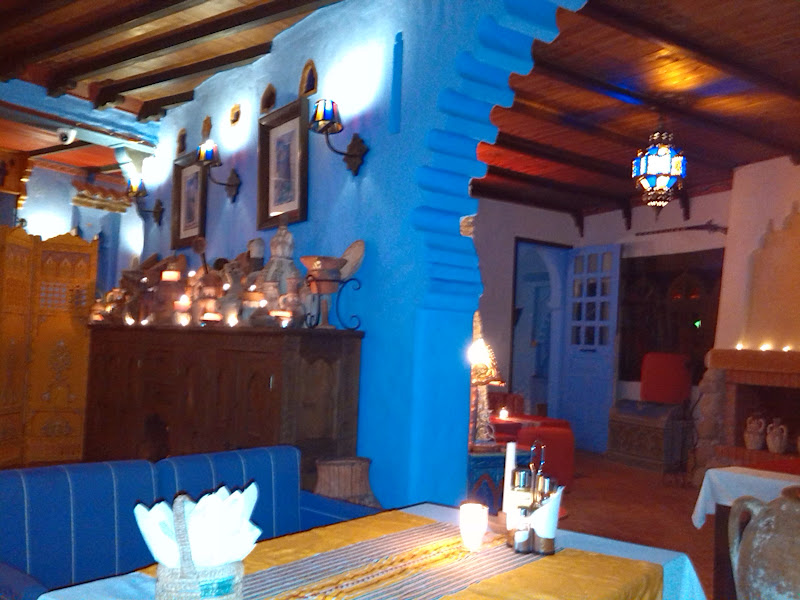
And a picture of what the place looks like in the dark. It's quite nice at night, lots of little lights and lamps around and the garden was maintained well too.
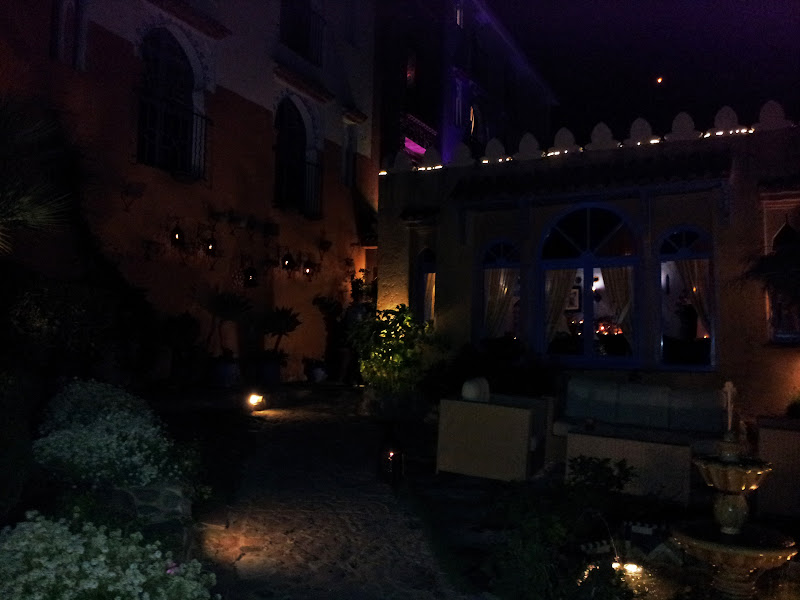
Tomorrow would be our first real riding day in Morocco and we'd be going further south still.

